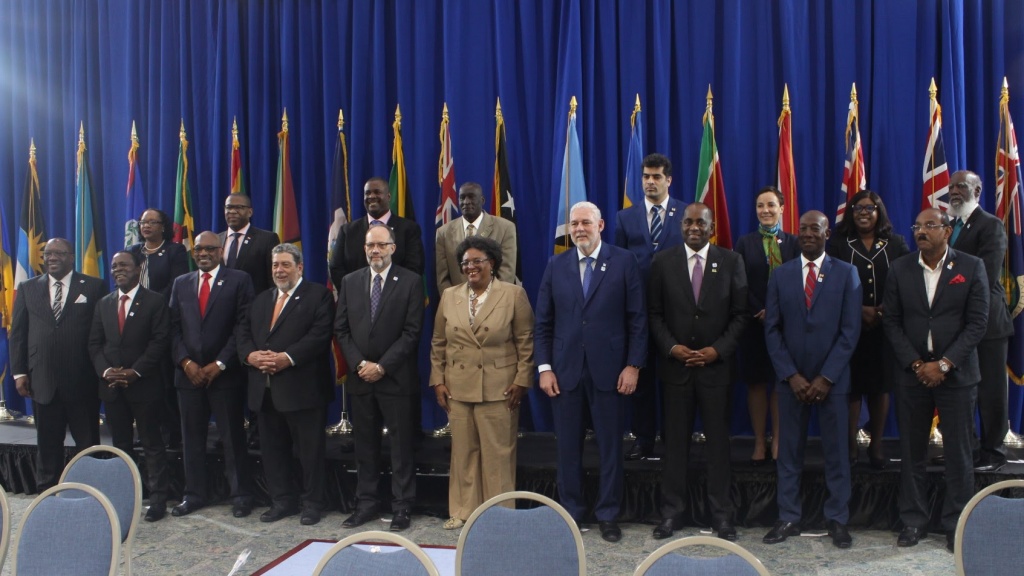
Community governance, a fixed single CARICOM roaming rate and a unified regional approach were among the key highlights of Chair of the Conference of Heads of Government of the Caribbean Community (CARICOM), Hon. Mia Amor Mottley, when she addressed the opening of the Thirty-First Inter-Sessional Meeting of the Conference in Barbados, earlier on 18 February 2020.
On the issue of community governance, the Chair noted that “some self-examination” was in order. Her references included the under-resourced CARICOM Secretariat which she said was now functioning with 30 million Eastern Caribbean dollars less than it did 10 years ago and with 40 people less than it did 30 years ago”, despite increasing challenges and new mandates.
She questioned whether the “appropriate governance and funding models to ensure the sustainability of this `family movement’ that is so vital to our being able to bring prosperity to our citizens”, was in place.
She suggested a review of the 2003 Rose Hall Declaration and the entire issue of community governance with a view to finding a modality that would allow for more effective implementation of Heads decisions, particularly those related to the CARICOM Single Market and Single Economy.
Speaking on matters of the digital economy, the Chair reiterated the Community’s belief in this sector’s “powerful role in the development of our economies”. She used this opportunity to make a very well received (given audience reaction) announcement of ongoing work to provide a “a modest fixed single CARICOM roaming rate for all CARICOM nationals”, which she informed will be announced shortly.
“Our teams have been working with operators in the telecommunications sector across the Region and indeed, Prime Minister Mitchell, who is the lead prime minister in this area, has, along with the CSME team, worked with the operators to shortly announce a modest fixed single CARICOM roaming rate for all CARICOM nationals to cover the cost of data for popular social media platforms including, those that offer messaging and calls”, she said.
“The rate will include an amount of local and regional voice calls, and over time this CARICOM rate will include more services. This is what it means to be family taking decisions”, she explained.
On the last issue of “family”, the Chair, throughout her presentation, reiterated the importance of a unified approach despite ideology, to surmount the ever present and changing global challenges before the Region.
She alluded to challenges such as: chronic non communicable diseases (NCDs), the existential crisis of climate, violence, which she noted had genuinely become a public health disorder; challenges to the Community’s fiscal sovereignty, among others. The Hon. Mottley reminded the gathering of the need to rely on the bonds of family to make the decisions that would effectively address the challenges before the Community.
“There is always strength in unity … We ought to be able to find the resolve to understand that we meet here today, not because we share a common ideology, but …. because we are family. We are kith and kin”, she said.
Continuing, she noted that whether it is at the level of countries or at the level of homes and communities, “being kith and must stand for something”; adding – “… determining how best we move forward with the character that defines us as being resilient is important.”
The Chair used the current threat to the Region posed by COVID-19 (corona virus health emergency) to demonstrate the benefits of family and taking decisions to confront our challenges. She singled out regional institutions: CARICOM Implementing Agency for Crime and Security (IMPACS), and its sub-agency Joint Regional Communication Centre (JRCC) and the Caribbean Public Health Agency (CARPHA) that are working along with other agencies to keep the emergency out of the Region.
The Hon. Mia Mottley who also dealt with issues such as regional air transport and the financing for the Caribbean Development Fund, among others, exhorted her fellow colleagues to “perfect a finer vision for ourselves [the Community] and act to create that vision.”
—
SOURCE: CARICOM Secretariat





